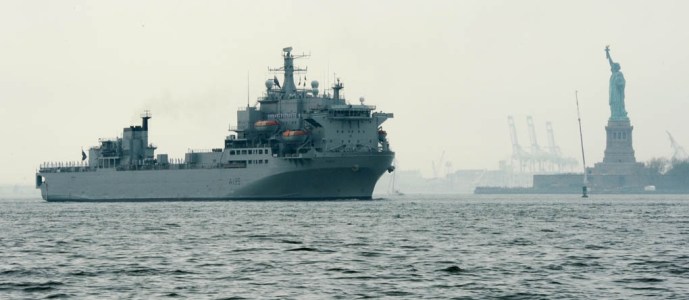For a National Strategy…
Including Carriers?

Commentary – Odin’s Eye

In Britain the Public Administration Select Committee has accused the coalition government of muddling through. Furthermore, it feels the UK has no coherent and relevant national strategy aims and this is leading to ‘mistakes, which are becoming evident in such areas as the Strategic Defence and Security Review’s carrier policy.’
Good strategy, says the PASC, works in a virtuous circle. No strategy or poor strategy results in a vicious circle. However coded the language, this is hard criticism from a committee chaired by Bernard Jenkin, one of the government’s most senior and respected backbenchers.Some of the Government’s early mistakes could be forgiven for it was in its infancy – after three terms of New Labour, few Tory ministers and no Liberal ministers had any experience of office. Unfortunately, whether it is the difficulties of managing a coalition or weaknesses in leadership, the UK’s government has proved to be weak and vacillating. If the Prime Minister and his government had a comprehensive national strategy that could be expressed clearly, those aspects of national policy that are, frankly, a mess – airports, energy and climate change, child poverty targets, welfare spending and the economy – would become manageable. The previous government, New Labour, understood the need for national strategy even if it did not always fund its elements properly. In Defence terms it decided upon an expeditionary strategy, which despite ‘Blair’s wars’, it largely followed, until it strayed into long-term land-based commitments in Iraq and Afghanistan. New Labour also understood strategy in Industry terms, including the value of large construction projects. Some may argue that the Navy’s new carriers were kept in being for the reasons of employment and votes, mostly in Scotland, rather than Defence, but they at least got underway, an example of virtuous policy. In Britain’s present circumstances, if government strategy were to promote employment and profits in British industry then its commitment to the F35 (B or C) is justified by BAE Systems’ share of the jet’s build programme. If UK strategy is to provide the country with the best defence at the lowest cost and as soon as possible, then buying or leasing an air group of F-18s is fully justified. These would be two aspects of a virtuous strategy which are entirely compatible, an ‘overarching strategy’ as has been urged by the Joint Committee on National Security. Of course, the choice of strategic direction for the country is both determined and limited by economic conditions and interests, but it is unfortunate the present British Government, like its predecessor, is seduced by the seeming attractions of soft power. Under policies determined by an ‘overarching strategy’, economic conditions and interests would appear to dictate that the British overseas aid budget should not be ring-fenced. The Department For International Development (DFID) should be challenged, like every other department of government, to reduce its bloated bureaucracy and – a particular offence to British voters – to do more to ensure that (as reported by the World Bank) one-third of aid money doesn’t just go to corrupt officials, and that rich, competing nations like India and Turkey are not also major recipients of British aid. The DFID annual give-away exceeds the bill for the carriers alone, and yet the latter will safeguard the UK for 50 years, preserve the jobs of tens of thousands of Britons and contribute to the nation’s industrial skills base. The bill for the London Olympics is similarly about the same as the carriers. The long-term benefit of that event to the UK as whole is far from certain. The carriers are a far safer bet. Who among the Con-Dem government articulates those salient facts to the British public? Or even understands the multi-level benefits as part of national defence-industrial-economic strategy? In British government circles there is much wishful thinking about the Internet and globalisation abolishing the nation state, with security outsourced to supranational bodies, whether these are the UN, NATO, EU, or some magically conjured up coalition of the day. But, as the present and endemic financial crisis in the EU shows, even after decades of integration, national interests will rule. Everything points to the need for a national, overarching strategy and that this must necessarily be long-term. A Defence strategy ought by now to be in place to give the government a clear idea what it’s going to do when British forces come home from Afghanistan. As the PASC says: ‘Only a clear national strategic framework can place day-to-day decisions in the long-term context’, or else: ‘Emergent strategy is more likely to throw up unanticipated problems, such as the need to revisit carrier aviation policy.’ Incredibly, it appears that senior figures in the government are poorly briefed on the carriers, the choices of jets available and have taken very little effort to acquaint themselves with the vital issues at stake, despite being in charge of key policy recommendations and decisions. It’s yet another feature of the dreamscape inhabited by some of the so-called big thinkers in British political life, who seem more au fait with ‘Britain’s Got Talent’ than ‘Britain’s Got a National Strategy.’


Pictured: The Royal Fleet Auxiliary (RFA) aviation training ship Argus reaches New York in May for the city’s Fleet Week, flying the flag for the UK. In the past the nation might have sent a carrier or a frigate, but with fewer ships – and no strike carriers since early 2011 – the British fleet is heavily committed elsewhere. Photo: US Navy.







Comments
Sorry, comments are closed for this item